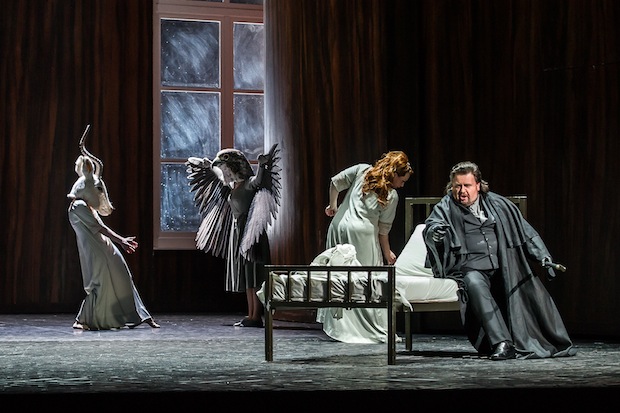If ever an opera was weighed down by its creators’ joint ambition, it is Die Frau ohne Schatten. Richard Strauss and his librettist Hugo von Hofmannsthal quickly began to imagine their third true collaboration, produced during the 1910s but not premièred until 1919, as their masterpiece. But it turned into a complex and unwieldy embarrassment of riches, albeit a glorious one. The charge that this enormous fairy tale represents the librettist and composer at their most pretentious and overblown is difficult to refute, and such charges are compounded by the fact that the surface message of its plot — in which a shadowless and infertile spirit Empress learns compassion and gains humanity, a shadow and fecundity — can be read as a kind of pro-procreation parable.
One of the virtues of the Royal Opera’s new production — first seen at La Scala in Milan in 2012 — is that it precludes such a simplistic interpretation. The German director Claus Guth, a well-known name on the continent but here working in the UK for the first time, frames the action as the Empress’s fevered dream. But this dream dissolves precisely as the final act reaches its apparently happy ending with a scrunching, overburdened musical climax — a moment patiently prepared by conductor Semyon Bychkov, before being unleashed to shattering effect.
Such a framing device might seem like an old trick, or even a cop-out, a kind of carte blanche to play fast and loose with the plot. And in the first act it did occasionally feel that way, with Guth superimposing his own symbols over those already in the opera: whose story was being told, I wondered, Strauss and Hofmannsthal’s, Guth’s, or a muddled mixture of both? It felt cluttered and confusing early on, especially with the addition of a double for the Empress (in half-gazelle form) and her normally absent father, Keikobad. The Emperor’s falcon (the soprano Anush Hovhannisyan, in wings and bird head) also played a larger role than normal.
Christian Schmidt’s visually striking set places us around the time of the opera’s composition and features a vast, elegantly curving wooden wall with revolving, removable central section. Andi A. Müller’s video designs are left to take up some of the slack where Guth decides against conjuring up the magic effects asked for in the libretto, and what effects we do have initially seem a touch clunky. Something’s inevitably lost, too, through the incessant focus on the Empress and the flattening out of the opera’s distinction between the spirit and human worlds.
But as Guth’s own story takes hold and gains focus, the production becomes increasingly compelling on its own terms: it’s hauntingly beautiful to look at, and the big scenes for the Emperor and Empress are given extra focus and resonance as the director deploys his symbolic extras. The dream element, meanwhile, keeps the finale healthily ambiguous, saving it from charges of hollowness.
The performances of the principals — most of them veterans of the production’s Milan run — are also astonishingly good. Emily Magee’s Empress is a powerfully intense presence, and she produces a glorious, creamy sound throughout. Her Emperor is, as so often, somewhat vaguely defined, but Johan Botha sings with prodigious stamina and clarion tone. The human couple is hardly less fine, although Johan Reuter doesn’t quite have the richness and sheer refulgence of tone one wants for the patient, warm-hearted Barak. Elena Pankratova, as his truculent Wife, however, has the necessary power but also — much rarer — the necessary lyrical beauty to make the character more than simply a nag.
Michaela Schuster is wonderfully twisted as the Empress’s Nurse, scheming and Machiavellian, if teetering a little close to Wicked Witchery — especially so given her top-hatted and batwinged minions. Ashley Holland is a stentorian, unflinching Spirit Messenger, and the Royal Opera’s ensemble fills out the other sundry roles well enough, even if some of the offstage effects didn’t seem quite right acoustically, at least from my seat.
Having to have a handful of percussionists in the stalls circle (along with Dušica Bijelic’s Guardian of the Threshold) was a shame, too, upsetting the balance of the vast orchestra, otherwise so beautifully maintained by Bychkov. And the Russian conductor and a Royal Opera House Orchestra on magnificent form were perhaps the greatest heroes of the evening. The enormous score, although cut, was unfurled with an irresistible inevitability under his control, the sound was beautifully rich and well variegated, and there was clarity and flexibility even in the most convoluted and congested passages.
Guth’s production ultimately brings little elucidation of the opera’s own complex allegorical plot, but it’s powerfully realised theatre. It is also profoundly musical, amplifying the power of Strauss’s remarkable score. I soon stopped trying to join the dots and surrendered to the overwhelming, compelling effect of it all.






Comments